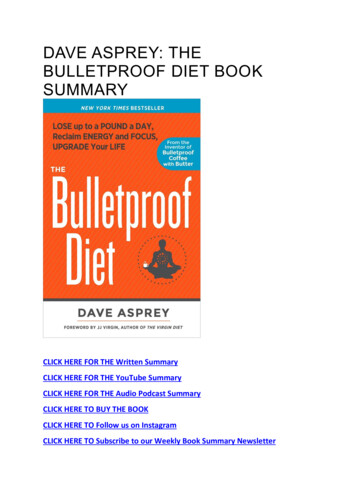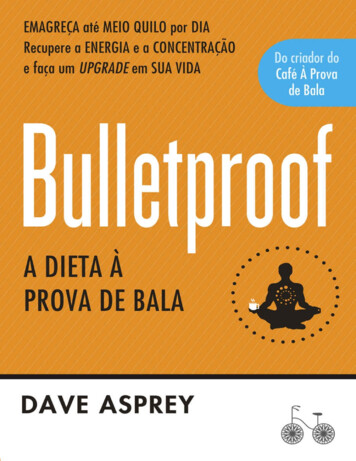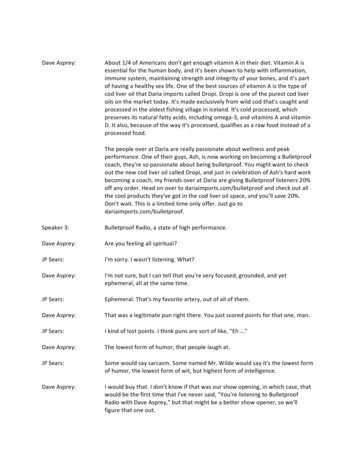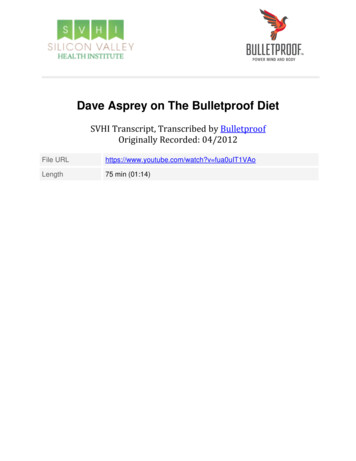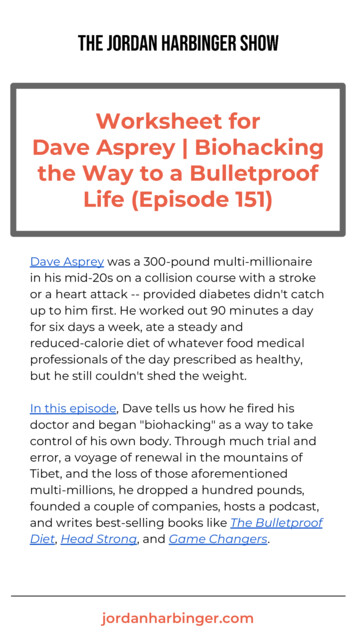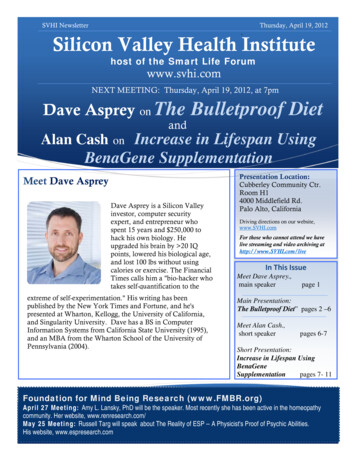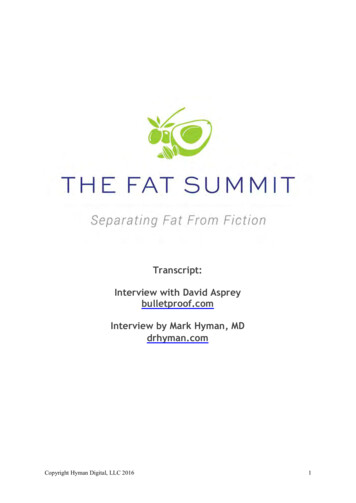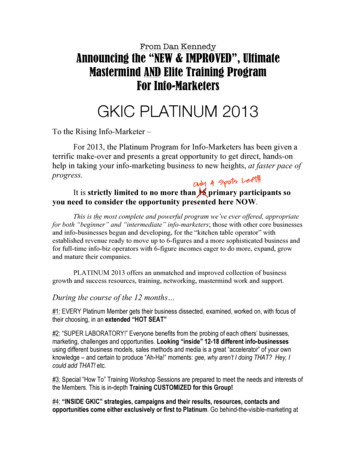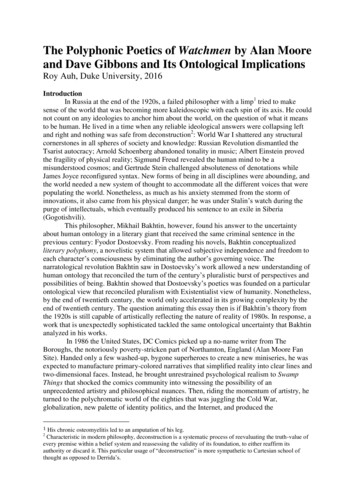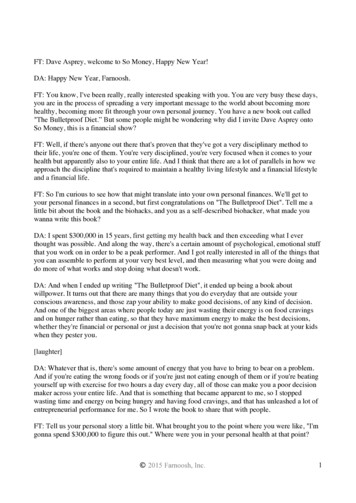
Transcription
FT: Dave Asprey, welcome to So Money, Happy New Year!DA: Happy New Year, Farnoosh.FT: You know, I've been really, really interested speaking with you. You are very busy these days,you are in the process of spreading a very important message to the world about becoming morehealthy, becoming more fit through your own personal journey. You have a new book out called"The Bulletproof Diet.” But some people might be wondering why did I invite Dave Asprey ontoSo Money, this is a financial show?FT: Well, if there's anyone out there that's proven that they've got a very disciplinary method totheir life, you're one of them. You're very disciplined, you're very focused when it comes to yourhealth but apparently also to your entire life. And I think that there are a lot of parallels in how weapproach the discipline that's required to maintain a healthy living lifestyle and a financial lifestyleand a financial life.FT: So I'm curious to see how that might translate into your own personal finances. We'll get toyour personal finances in a second, but first congratulations on "The Bulletproof Diet". Tell me alittle bit about the book and the biohacks, and you as a self-described biohacker, what made youwanna write this book?DA: I spent 300,000 in 15 years, first getting my health back and then exceeding what I everthought was possible. And along the way, there's a certain amount of psychological, emotional stuffthat you work on in order to be a peak performer. And I got really interested in all of the things thatyou can assemble to perform at your very best level, and then measuring what you were doing anddo more of what works and stop doing what doesn't work.DA: And when I ended up writing "The Bulletproof Diet", it ended up being a book aboutwillpower. It turns out that there are many things that you do everyday that are outside yourconscious awareness, and those zap your ability to make good decisions, of any kind of decision.And one of the biggest areas where people today are just wasting their energy is on food cravingsand on hunger rather than eating, so that they have maximum energy to make the best decisions,whether they're financial or personal or just a decision that you're not gonna snap back at your kidswhen they pester you.[laughter]DA: Whatever that is, there's some amount of energy that you have to bring to bear on a problem.And if you're eating the wrong foods or if you're just not eating enough of them or if you're beatingyourself up with exercise for two hours a day every day, all of those can make you a poor decisionmaker across your entire life. And that is something that became apparent to me, so I stoppedwasting time and energy on being hungry and having food cravings, and that has unleashed a lot ofentrepreneurial performance for me. So I wrote the book to share that with people.FT: Tell us your personal story a little bit. What brought you to the point where you were like, "I'mgonna spend 300,000 to figure this out." Where were you in your personal health at that point? 2015 Farnoosh, Inc.1
DA: When I was about 26, I had weighed up to 300 pounds and I started getting brain fog. I wasworking at a company in Silicon Valley that I had become very successful. In fact, I made 6million when I was 26. I lost it when I was 28, by the way. [laughter]FT: We will get to that.DA: Oh yeah. But at the time I was like, "I don't remember what happened in this meeting. Mybrain isn't working. I don't have the energy to bring it when I want to." And I'm a pretty smart guyand I just felt like I was losing my edge. I just didn't have that energy. So I started measuring thisand paying attention to it and realized that there were a whole bunch of things I was doing thatweren't working. I also started taking smart drugs and I just decided that if I was going to have thecareer that I wanted, that I was gonna have to get on top of my biology. That's why I worked out sixdays a week for an hour and a half a day and I did all sorts of things. I tried many different diets.DA: But along the way, it was always what makes me perform the best? Not just look good causeit's relatively easy to lose weight, with just. Of a famine with a tiger chasing you, and you'll loseweight, you'll just gain twice as much back. [laughter] Unfortunately, you have to do it right, notjust the easy way. And I've been. I've kept that hundred pounds of fat off for more than a decadenow, and I don't use effort or will power to do it. It's an effortless thing. It just happens when youeat right. When you've cracked that code for what foods make you bulletproof and what foods arekryptonite to you, it might be different than the guy next to you, but you better know what makesyou weak and stop doing it.FT: Give us a little sense of what we can expect from "The Bulletproof Diet". Tease us. I'm reallycurious to learn what I might be able to accomplish and I'm happy to hear that I don't have to enter afamine and be chased by a lion or a tiger to lose weight. What are some of the unique tips that youprovide in the book that you're especially proud of?DA: One of the most important ones is you've gotta eat more healthy fat to be a high performer andI don't mean drinking olive oil, I mean, grass-fed butter, avocados, even things like a steak fromhealthy animals that ate grass. The quality and type of the fat you eat is at the foundation of whoyou are. And I say this 'cause your hormones are made of fat. Your cell membranes, every cell inyour body are made of fat and your brain is made of fat. So if you don't eat quality fat that'sundamaged, over time, you're not gonna perform the way you could and you're gonna experience alot more food cravings which you just don't wanna have.FT: Let's talk money now. I'm curious to hear how some of your health philosophies might bemirrored in your financial philosophies. And that's my first question is, what is your best, a mostsacred financial philosophy that helps guide your decisions? And you are somebody who is a verysuccessful entrepreneur. You've sold businesses. You know a thing or two about money. But I'mcurious in terms of managing your money, earning your money, saving your money, growing yourmoney, what's your philosophy?DA: It comes down to awareness, and it's exactly the same for food and money. And hence, there isa whole universe of things that happen in your body that are not visible to your conscious brain. Iactually write about this in "The Bulletproof Diet". There's a whole conversation that happens.There's kind of three big buckets, and this is between your nervous system, and you can almostthink of your nervous system as a separate part of you. And it just ties directly to the financial 2015 Farnoosh, Inc.2
decisions you make.DA: The first thing, if you imagine a Labrador Retriever in your mind, this is what the Buddhistswould call "the monkey mind". But there's a part of you that, if you imagine that floppy dog, yousay, "Look, there's a stick!" And you run aFTer it. That's distractiblity. And also, "Oh, is thatsomething I should be afraid of?" So there's this constant seeking for something that's eitheropportunity or something that's a threat. That's actually not really your conscious human brain,that's an automated defense system in your body.DA: There's also this, "Oh, look, I'll eat anything," which is what that Labrador will do, and there'salso that, "Oh, look, there's a leg, I'll go mate with it." So those are the three survival behaviors forthe species. And as I look at how did I lose 6 million when I was 28, it was because my body, mynervous system's automated protection systems, were forcing me to not pay attention to what wasimportant because honestly, my nervous system was afraid of them.DA: As a conscious, intelligent human being, I wasn't afraid of them, but I didn't realize that thefear response in my body had nothing to do with logic. So when I look at managing my money, thefirst thing I do is I look at what is my nervous system's response to a financial situation. Is there afear or a tension or something? And if there is, I pay a lot of attention to it until that goes away,because I don't want to be dealing with money on that level.DA: I will honor my nervous system if I have a deal in front of me, and some part of me is like,"Run screaming, this is a bad deal." Okay, I'll go with my gut. And all the great venture capitalists,when you talk to them about this, they'll say the same thing. Some part of what they do is intuition.So I trust my intuition, but I listen to my nervous system, and I don't let it make decisions for me. Imake them consciously.FT: How do you reconcile this? Because on the one hand, like you said, you want to respect yournervous system, you wanna be conscious, and if your gut's telling you to run the other direction,you might. But then, how do you manage that so that you actually end up, like you say you haveto. You want to squash those fears. How do you squash those fears? What is the conscious effortthat you make to make sure that your nervous system isn't necessarily taking over in a negativeway?DA: Some of my clients are very successful people, and I coach them on how to do this. I have veryfew coaching clients, I'm a CEO and I'm running Bulletproof, but I still set aside some time to sharewith other people I really, frankly, would like to spend time with anyway. I use a technique calledHeart Rate Variability training. There's a little 99 sensor that hooks up to your iPhone, and it'scalled the Inner Balance Sensor. I carry it on bulletproof.com, but it's not a main part of mybusiness. You can buy them on Amazon, too.DA: And what you do is, you plug this thing into your ear and into your iPhone, and you take adeep breath. If your body is in a sympathetic, this is a fight-or-flight kind of mode, then the iPhoneturns red. Or at least the icon turns red. And if you're in a parasympathetic dominant, this is therelaxed, conscious mode, then it turns green. One of my clients learned what it feels like when itturns red because he got into the green zone. He's a hedge fund manager. He's sitting on an airplaneand he thinks about work and it turns red. He goes, "Oh, wait a minute, when I think about work, 2015 Farnoosh, Inc.3
my body gets ready to run away and hide." So he learned to overcome that.DA: He takes it into the office, turns it on, the market bell rings, and it goes red, and it stays red allday. So he was treating billions of dollars in a fight-or-flight mode. So it took him about two weeksof training himself to be aware of when his body did that, and then to take steps to turn that off,until at the end of the day, he had twice as much energy and he felt better and he made betterdecisions. I do that with myself all the time, and I do more stuff with advanced neurofeedback.FT: So, did he do breathing exercises? Did he drink more coffee? What was he doing? What werethe steps?DA: It's actually a short breathing exercise that's guided by the iPhone. But what he's doing is he'slearning what it feels like to change the spacing of his heartbeats. Not to make it go faster or slower,but just to space them differently. There is no way that you or I sitting here could know what thatfeels like, but when the iPhone tells you, it's actually kind of an advanced form of meditation, onethat you would arrive at over years of practice, except we're all too busy to take years of practice tolearn something that you can learn in about two or four weeks of doing this for 10 minutes a day.DA: So, it's like breathing exercises for 10 minutes a day, and at the end of a month or so, yourealize that you now know when your body gets ready to run away, and you know how to turn thatoff. And that is. It frees enormous willpower that you can use to make better financial decisions.You can stop being afraid of anything that way.FT: And you can avoid the irrationality that can sometimes take over, and it's very human naturesort of thing. So the Heart Rate Variability training is what you recommend and there's an app forthat. [chuckle]DA: You call this. It's not an expensive thing either.FT: Okay.DA: And, like I said, it's not a part of my business. I'm an advisor of the company it makes it, calledHeartMath, but I'm not a paid advisor. It's been transformed, for my own ability, to pay attention, soI make it available for people.FT: Very, very, very cool. Okay, money memories, Dave. Let's talk about an experience that youhad, perhaps in your childhood, perhaps more recent, that was very influential in how now youthink about money and manage your financial life. Take us there.DA: Back when I was 26, 27, when I made that 6 million, it's remarkable to think you're done.You can do whatever you wanna do for the rest of your life, and then to lose that. It's actually reallytraumatic. Even the WHO, a list of traumas, it says, losing masses of money like that is like losing afamily member in terms of the psychological stress you go through. And I remember back then, thatwhen I had 6 million on paper and some substantial amount in the bank, that I thought, "Youknow, I'll be done when I make 10." And I know when I would have got to 10 it would've been at20.DA: And so you can always be chasing it, and it goes straight back to that Labrador in your head 2015 Farnoosh, Inc.4
that's looking for the stick and something else. So, the bottom line is that a lot of people alreadyhave enough money, that it's not about the money anymore. It's about something else. And what it'sbecome about for me is, money. As soon as you have your base needs met, money is a tool, andfor me it's a tool to help other people. And different people have different desires for money and Irealize for me to achieve some of the goals that I have, it will take money, and I have no guilt orreservations about that.DA: When I was younger, and I look at why I was going for that six or that 10 million, it was a fearand a want, and like a psycholo
"The Bulletproof Diet.” But some people might be wondering why did I invite Dave Asprey onto So Money, this is a financial show? FT: Well, if there's anyone out there that's proven that they've got a very disciplinary method to their life, you're one of them. You're very disciplined, you're very focused when it comes to your health but apparently also to your entire life. And I think that .
